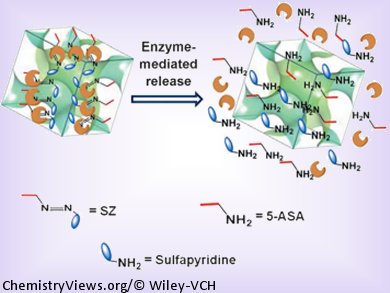Mesoporous silica nanoparticles are nanospheres endowed with a porous structure which can be filled with drugs. In most of the cases, therapeutic cargos are physically absorbed into the pores of nanoparticles and, consequently, they may be released in the absence of a specific stimulus. Amirali Popat, University of Queensland, Australia, and colleagues showed how to overcome this problem.
The researchers covalently bound mesoporous silica nanoparticles to sulfasalazine, a pro-drug used to treat inflammatory diseases of the colon. The covalent bond prevented sulfasalazine’s premature release in the absence of a precise trigger. As sulfasalazine is a substrate of azo-reductases, enzymes produced by colon’s bacterial flora, the release of the pro-drug and its cleavage into active metabolites occurred only in the presence of these proteins.
Thus, covalently attaching pro-drugs to mesoporous silica nanoparticles might be used to achieve their specific, stimulus-induced release.
- Enzyme-Responsive Controlled Release of Covalently Bound Prodrug from Functional Mesoporous Silica Nanospheres,
A. Popat, B. P. Ross, J. Liu, S. Jambhrunkar, F. Kleitz, S. Z. Qiao,
Angew. Chem. Int. Ed. 2012.
DOI: 10.1002/anie.201206416




